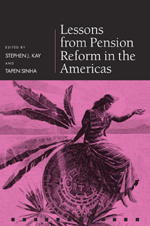Stephen J. Kay and Tapen Sinha, Editors
Latin American experiments with pension reform began when Chile converted its public pay-as-you-go system to a system of private individual accounts in the early 1980s. Several other Latin American countries then followed suit, inspired both by Chile’s reforms and by World Bank recommendations stressing compulsory government-mandated individual saving accounts. Individual accounts were subsequently introduced in a number of countries in Europe and Asia.
Many are now re-evaluating these privatisations, with the most dramatic effort to ‘reform the reform’ coming from Chile, where President Michelle Bachelet has recently backed a comprehensive initiative aimed at making the system more efficient and equitable. This volume is the first to assess pension reforms in this new ‘post-privatization’ era.
Section 1 of the book begins with a discussion on demographic trends by Nobel laureate Robert W. Fogel, followed by several chapters on system design and their policy implications. Work covers demographic trends, pension system default options, and an analysis of World Bank’s policies and how they have evolved. The section concludes with chapters on reform and the role of gender in pensions. Section 2 offers in-depth analysis of major reform efforts in the United States, Canada, Mexico, Costa Rica, Brazil, Peru, Uruguay and Argentina.
The volume provides an unparalleled account of the lessons from pension reform in the Americas, addressing the most pressing policy issues and highlighting a broad range of country experiences.
January 2008 · Oxford University Press · ISBN 0-19-922680-6
- Order online from Oxford University Press
- Table of Contents and Chapter 1: Overview: Lessons from Pension Reform in the Americas
Stephen J. Kay and Tapen Sinha - Chapter 2: The Chilean Pension Reform Turns 25: Lessons from the Social Protection Survey
Alberto Arenas de Mesa, David Bravo, Jere R. Behrman, Olivia S. Mitchell, and Petra E. Todd, with assistance from Andres Otero, Jeremy Skog, Javiera Vasquez, and Viviana Velez-Grajales - Chapter 3: The Importance of Default Options for Retirement Saving Outcomes: Evidence from the USA
John Beshears, James J. Choi, David Laibson, and Brigitte C. Madrian - Chapter 4: The Gender Impact of Social Security Reform in Latin America
Estelle James, Alejandra Cox Edwards, and Rebeca Wong - Chapter 5: Pension Reform and Gender Inequality
Michelle Dion - Chapter 6: Reflections on Pension Reform in the Americas: From ‘Averting the Old-Age Crisis’ to ‘Keeping the Promise of Old-Age Security’ and Beyond
Estelle James, Truman Packard, and Robert Holzmann - Chapter 7: Bounded Rationality in Latin American Pension Reform
Kurt Weyland - Chapter 8: Perspectives from the President’s Commission on Social Security Reform
John F. Cogan and Olivia S. Mitchell - Chapter 9: Reforms to Canadian Social Security, 1996-7
Robert L. Brown - Chapter 10: A Decade of Government-Mandated Privately Run Pensions in Mexico: What Have We Learned?
Tapen Sinha and Maria de los Angeles Yañez - Chapter 11: Pensions in Brazil: Reaching the Limits of Parametric Reform in Latin America
Milko Matijascic and Stephen J. Kay - Chapter 12: Costa Rica’s Pension Reform: A Decade of Negotiated Incremental Change
Juliana Martínez Franzoni - Chapter 13: The Peruvian Pension Reform: Ailing or Failing?
Eliana Carranza and Eduardo Morón - Chapter 14: Uruguay: A Mixed Reform
Rodolfo Saldain - Chapter 15: The Pension System in Argentina
Rafael Rofman - Chapter 16: Epilogue: The Future of Retirement Systems in the Americas
Olivia S. Mitchell - Index
- More PRC Books



